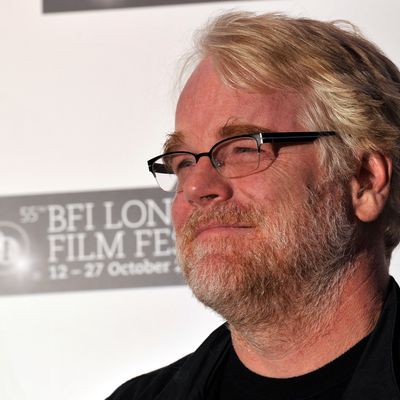
First, you curse.
Then you ask, “Why?” and, absent a good answer (there is never a good answer), you think about what made Philip Seymour Hoffman great — and wonder if a key to understanding his absurd death at the age of 46 from a drug overdose can be located somewhere in that greatness.
Eight years ago, I ate lunch with Hoffman in the East Village for a New York Times profile and had a small inkling of his demons. Capote had just come out and he was the favorite to win an Oscar. (He did.) He talked about what it had taken for a man with a big head, big body, and big deep voice to embody a man with a small head, small body, and bizarre baby voice — about the training that wasn’t unlike what he’d done as a high school jock (yes, he was a jock!), pushing his body and voice to places he wasn’t even sure were in reach. And then he talked about the editing fights he’d had with his old friend, the first-time director, Bennett Miller.
When you hear about cutting-room fights, it almost always means the star thinks he or she is coming off as too unlikable and wants the director to ratchet up the vulnerability quotient. But Hoffman was arguing to make Capote less attractive — to make him, in fact, thoroughly reprehensible. He said he told Miller, “The way toward empathy is actually to be as hard as possible on this character.”
I said I had no idea what he was talking about.
“I think deep down inside, people understand how flawed they are,” he said. “I think the more benign you make somebody, the less truthful it is.”
Yes … if you think that who we are at our worst is who we really are. And I’m pretty sure Hoffman did think that.
Ever since then, I’ve been conscious of how much he went out of his way to make his characters un-benign. It was central to his power as an actor, though I wonder if at times he didn’t confuse self-hatred for integrity.
His delivery could seem groggy, as if he couldn’t be bothered to clear his throat or gargle or expend any effort to be more attractive than he thought he was — which was not attractive at all. You can feel how far inside his comfort zone he is in The Talented Mr. Ripley as a through-and-through snob who barely acknowledges the title character’s existence or in Charlie Wilson’s War as a spy described as the “anti-James Bond” who refuses to suck up to his superiors (or the audience).
A few years after our interview, I complimented him on what might be my favorite of his performances, the brother of the playwright protagonist (Laura Linney) in The Savages — a funny, likable, normal guy.
“He’s probably one of the characters closer to me than most,” Hoffman said.
“He’s not grotesque,” I said.
“Well, everyone’s life is grotesque if you look close enough. I don’t shy away from that side.”
“No, you go in the other direction.”
“Right.”
Hoffman was famous for beating himself up on sets. He hated the ease with which his body put on weight. He also talked openly about his various addictions. (He was last in rehab for substance abuse in the spring of 2013.) Several years ago on NPR’s Fresh Air, Terry Gross asked him about his alcoholism and why he couldn’t just limit himself to, say, one or two drinks at dinner. He said he never wanted one or two drinks. He wanted the whole bottle. The point, he said, was to drink and keep drinking. He wanted to be liberated from self-disgust. He sought out oblivion.
I have no good excuse for missing his Willy Loman onstage (except I couldn’t get a ticket), but I saw his Jamie Tyrone in A Long Day’s Journey into Night and was ever so slightly disappointed. He was superb, of course: Tyrone Jr. is riddled with self-hatred and guilt, and Hoffman was poignantly credible telling his younger brother not to trust him. What he didn’t have was the boozy Irish bravura that made Jason Robards’s O’Neill performances so transporting. Hoffman could never see himself as a romantic figure—not for an instant.
His onscreen legacy? I put The Savages above even Capote, but the latter is certainly an Olympian feat, a triumph of sympathetic (and unsympathetic) imagination. Charlie Wilson’s War should be seen because he’s so palpably happy in the role. His Father Flynn is Doubt is one of his best performances, largely because he plays the (probably pedophilic) priest as a man who doesn’t believe he’s a sexual predator and is therefore at ease with himself. (The only Hoffman characters at ease with themselves are the bad ones.) His L. Ron Hubbard stand-in in The Master is in the tradition of flimflam visionaries so in love with their own spiels they forget they’re frauds. Further back, he’s a howl in Along Came Polly in a Chris Farley-like part, a guy with a vast appetite and zero shame.
I suspect Philip Seymour Hoffman had a lot of shame in his life and dealt with it by making himself as odious as possible in other arenas. Sometimes he went too far, but even then his performances could be revelatory. The only thing ordinary about this extraordinary actor was how he died.
For that, you curse.


